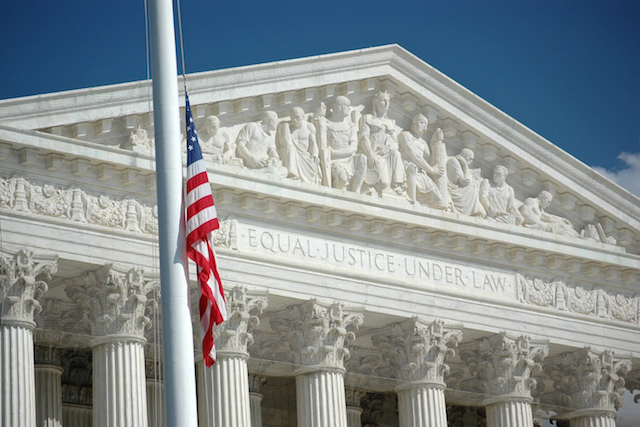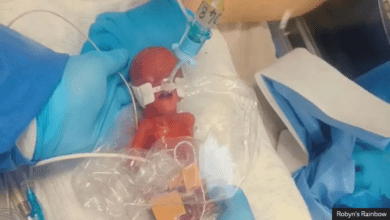Supreme Court Rules Joe Biden Can’t Force Idaho to Turn ERs Into Abortion Centers

In a victory today, the Supreme Court ruled that Joe Biden cannot force Idaho to turn its emergency rooms into abortion centers – for now while the case continues.
The nation’s highest court has ruled that Joe Biden cannot take advantage of a federal law to try to undermine Idaho’s abortion ban by allowing emergency room doctors to perform abortions.
The ruling follows a federal appeals court ruling this week that stopped Biden from doing the same thing in Texas.
Last year, the Justice Department filed a case Aug. 2 against the state of Idaho, hoping to undermine its new law banning most abortions by saying that state law contrary to EMTALA and medical treatment for pregnant women in emergency rooms.
The Justice Department filed a lawsuit challenging Idaho’s protective law — arguing that it would prevent allegedly medically necessary abortions. Despite false reports that abortion bans will prevent doctors from treating pregnant women for miscarriages or ectopic pregnancies, pro-life doctors confirm that is not the case. Some 35 states have laws that make it clear that miscarriage is not abortion and every state that has an abortion ban allows treatment for both.
REACH PRO-LIFE PEOPLE AROUND THE WORLD! Advertise on LifeNews to reach hundreds of thousands of pro-life readers each week. Contact us today.
US District Judge B. Lynn Winmill found that Idaho’s law conflicts with federal law because it prohibits abortions in almost all circumstances. But the state has argued that any emergency abortion is permitted under its ban on elective abortions.
Now the country’s highest court will hear the case in April and issue a full ruling that will decide the case.
The case involves the Biden administration’s illegal attempt to use a law that ensures poor patients can receive emergency room care to force doctors to perform abortions that are illegal under Idaho law. .
Idaho’s pro-life law imposes penalties on doctors who perform illegal abortions unless doing so is necessary to save the life of the pregnant woman or other exceptions. The federal government claimed—and a lower court ruled—that EMTALA requires abortions to be performed in violation of this law if an emergency room doctor deems it appropriate.
“Hospitals—especially emergency rooms—are life-saving centers. The government has no business turning these into abortion clinics,” said ADF Senior Counsel Erin Hawley, vice president of the Center for Life and regulatory practice. “Emergency room doctors can, and do, treat ectopic pregnancies and other life-threatening conditions. But elective abortion is not life-saving care—it ends the life of the unborn. child—and the government has no authority to override Idaho’s law banning these procedures. We urge the Supreme Court to stop the lower court’s order and allow Idaho’s emergency rooms to fulfill their primary role— saving lives.”
After the Supreme Court returned the issue of abortion to the states in Dobbs v. Jackson Women’s Health Organization, the federal government sued the state of Idaho, claiming that EMTALA, a supplemental provision of the Medicare law, preempted Idaho’s pro-life law. But as explained in the emergency application, “EMTALA is silent on abortion and actually requires stabilization of treatment for the unborn children of pregnant women.”
“The United States’ position runs counter to the general agreement of federal appeals courts that EMTALA does no dictate federal standards of care or supersede state medical standards. The district court accepted the revisionist United States, thenDobbs reading EMTALA and Idaho’s Defense of Life Act is mandated in emergency rooms. The district court’s order effectively makes EMTALA’s protection for the uninsured on the issue of abortion a federal super-statute, one that strips Idaho of its sovereign interest in protecting innocent, human life and turns it into a federal to enclave emergency rooms where the state’s standards of care. don’t apply,” Hawley said.
Idaho’s abortion ban allows a physician who performs an abortion to raise the affirmative defense that the abortion was necessary to save the life of the mother or that the pregnancy resulted from reported rape or incest. In both cases, the physician must choose a procedure most likely to save the baby’s life and protect the mother. The law expressly excludes contraception from the definition of abortion, and women on whom abortions are performed may not be prosecuted.
Pro-life laws in Idaho and other states include clearly defined exceptions that allow abortion in cases where a mother’s life is at risk. Because the pro-life movement cares about the lives of mother and child and there are rare cases where only the mother’s life can be saved, it supports such exceptions.
But these exceptions mean the Biden administration’s guidance is unnecessary. Ignoring Idaho’s life-saving efforts and expanding abortions seems to be the administration’s real goal.





